Keith Miller's Blog, page 2
January 15, 2017
The Sins of Angels Goodreads Giveaway!
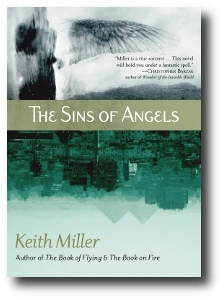
My publisher, PS Publishing, is doing a Goodreads Giveaway for The Sins of Angels. Ten signed hardcovers are up for grabs.
Published on January 15, 2017 04:26
September 14, 2016
Lithium Jesus
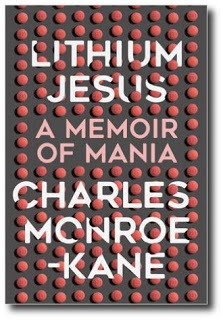
My friend Charles Monroe-Kane has published a memoir, Lithium Jesus, with the University of Wisconsin Press. Chuck and I were roommates our first year at Goshen College in 1987. We were an odd pair: I hadn't spent much time outside of East Africa and Chuck came from a poor Ohio family. Somehow, though, we hit it off and have remained friends for nearly thirty years.
This book tells the story of Chuck's struggle with mental illness, and his attempts to come to peace with himself via religion, drugs, sex, and other escapades. It's highly entertaining, by turns hilarious and heartbreaking. If you're paying attention, you might spot me flicker on and off the page at one point. I suggest you buy the book.
Published on September 14, 2016 12:39
September 1, 2016
The Sins of Angels Ebook
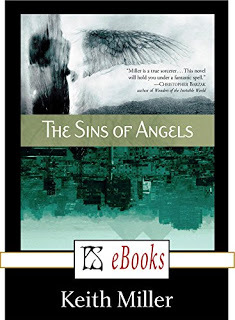
The Sins of Angels is now available as an ebook from Amazon. The signed and unsigned hardcovers are still available from the PS Publishing website.
Published on September 01, 2016 03:38
July 16, 2016
The Sins of Angels
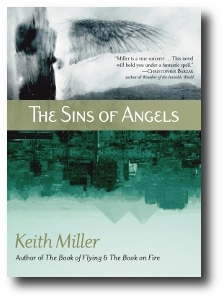
My third novel, The Sins of Angels, is now available for preorder from PS Publishing. It’s a noirish paranormal thriller set in Cairo and the Western Desert, about a couple of hapless detectives who stumble upon a fallen angel. At this point, it’s available in a limited edition of one hundred signed hardbacks, and as an unsigned hardback. You can read the first chapter on my website.
The publisher asked me to write something about the genesis of the book, and I’m including that below.
In 1999, after three years in southern Sudan, my wife and I moved to Egypt. Soon after we arrived, I picked up E. M. Forster’s Alexandria: A History and a Guide, which has been called the best guidebook ever written. It deftly melds the mythology and history of the city with modern-day landmarks. In the opening pages, Forster gives a brief synopsis of the Gnostic cosmogony, discussing the demiurge and Sophia, the last of the fallen angels. Reading his overview, I had a vision of a fallen angel on a Cairo sidewalk, and knew I would write her story one day.
Seven years later, the notion of a literary and detective agent came to me, and dovetailed with the earlier vision of the fallen angel. In the meantime, I’d discovered the Nag Hammadi texts and had delved deeper into Gnosticism, and realized I could fruitfully bring that knowledge to bear on the tale of Sophia and my blundering detective, George Zacharias. The book was started in Beni Suef in Upper Egypt, completed in Madison, Wisconsin, and polished in Ventura, California.
One of the great pleasures I had while working on this book was the discovery of Gustav Davidson’s A Dictionary of Angels: Including the Fallen Angels, an immensely rich and comprehensively researched text. I knew little about angels and their hierarchies when I started out, and Davidson’s book provided the background I needed to create a solid structure. I’ll leave off with the following passage from Davidson’s alluring introduction:
“Without committing myself religiously I could conceive of the possibility of there being, in dimensions and worlds other than our own, powers and intelligences outside our present apprehension, and in this sense angels are not to be ruled out as a part of reality—always remembering that we create what we believe. Indeed, I am prepared to say that if enough of us believe in angels, then angels exist...”
Published on July 16, 2016 02:59
May 29, 2016
Encounters in Africa
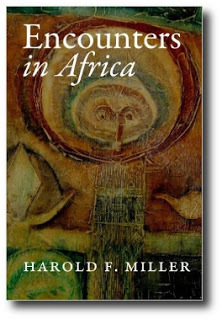
My father has led an extraordinary life. Born into an Amish family in Hartville, Ohio, he was the first in his community to go to college, where he met my mother. They joined Eastern Mennonite Board of Missions, and went to Tanzania, where my mother had been born, and then Sudan, where my father helped set up the Sudan Council of Churches. In 1974, they moved to Nairobi, where he worked first with the National Christian Council of Kenya (NCCK), then volunteered as regional representative for Mennonite Central Committee, and finally served as an adviser to the All Africa Council of Churches. He remains active in Nairobi and the region today.
He is perhaps the most modest person you'll meet, but has had an astonishing influence. While working in rural development with NCCK, he facilitated the creation of the first sand dams in Machakos, which have dramatically raised the water table in the region. The Nairobi Peace Initiative, which he helped set up, has had an enormous impact on the continent, and was instrumental in heading off Kenya's descent into civil war following the 2007 elections. At eighty, he is as active as ever, walking many miles a day and offering his services as mzee (elder).
Last year, my brother and I helped my dad get a collection of his occasional pieces into print. Encounters in Africa is the first volume, containing primarily lighter stuff: book reviews, anecdotes, travel pieces. A second volume, due out later this year, will include weightier material.
Recently, a Canadian Mennonite book group read Encounters in Africa. Their delightful reflections were published by The Mennonite under the title "An Evening with Harold." (The picture is of the author of the piece, not my father.)
Published on May 29, 2016 14:31
March 16, 2016
The Winged Histories
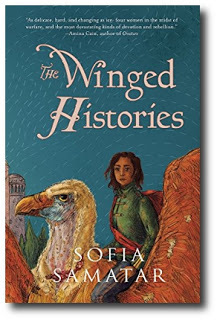
Sofia's second novel, The Winged Histories , is now out. Her first, A Stranger in Olondria, won the British Fantasy Award and the World Fantasy Award. This book takes place in the same densely constructed world. It tells the stories of four women in wartime, and is possibly more gorgeous and heartbreaking than Stranger.
Here's Sofia's blog post about the novel, and here's an interview at the Los Angeles Times.
Published on March 16, 2016 13:25
December 1, 2015
"Stone Collection"

I have a suite of three poems under the title "Stone Collection" in the latest issue of Masque & Spectacle. The sculpture above is by the featured artist, Jyl Bonaguro.
Published on December 01, 2015 10:19
November 25, 2015
Ursula K. Le Guin
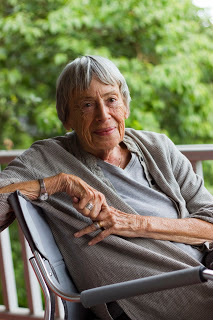 Image by Euan Monaghan/StructoLast weekend, Sofia and I made a pilgrimage to UCLA, where the Center for the Art of Performance was hosting an evening with Ursula Le Guin. We were in the plebe seats at the back of a massive hall, but it was nevertheless a magical experience. When she walked onstage, Sofia whispered: "That's the person who created The Tombs of Atuan," and it really was a bit surreal.
Image by Euan Monaghan/StructoLast weekend, Sofia and I made a pilgrimage to UCLA, where the Center for the Art of Performance was hosting an evening with Ursula Le Guin. We were in the plebe seats at the back of a massive hall, but it was nevertheless a magical experience. When she walked onstage, Sofia whispered: "That's the person who created The Tombs of Atuan," and it really was a bit surreal.She is eighty-six now, small and hunched, with a low voice and deeply wrinkled skin. For ninety minutes she was in conversation with an appropriately awestruck moderator and read from several works and took questions. She came across as witty, ridiculously intelligent, and somehow simultaneously kindly and prickly. Some of the more interesting moments: Rocannon's World, her first published novel, was in fact the sixth novel she wrote. She considers her first three published novels, which would include Planet of Exile and City of Illusions to be "apprentice work." Thus, I suppose, she would suggest that her real career begins with A Wizard of Earthsea, which is probably where most of her readers begin as well. Landscape and human intervention came up more than once. She read three poems about the Colorado River, before and after the damming, and offered a beautiful and emotional response to a question from Sofia about Always Coming Home, saying that she was trying to create a positive future for a landscape she cared for deeply. Her pacifist stance came through very strongly, as did her love of Virginia Woolf and J.R.R. Tolkien. In Earthsea, the old word for stone is tolk; it comes up at least twice, in poignant moments, and I believe this is a nod to Tolkien's influence on her. Furthermore, inien is the word for sea, so "Earthea" itself is possibly "Tolkien" in the old language. She mentioned Tolkien's "beats" - the alternating lights and darks, ups and downs, tensions and resolutions - which she says occur at every level: sentence, section, and chapter. She also told us that she read The Lord of the Rings aloud three times (to each of her kids), and is a strong believer in reading one's own work aloud.
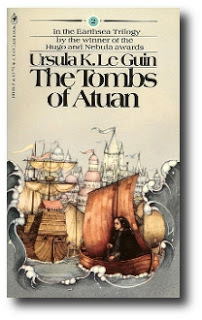
I read the first three Earthsea books in Nairobi at the age of nine or ten. They were the lovely set in the clamshell, with the spines that make a perky little fish when put together. They were immediately placed on that special pedestal that contains the other hallowed multi-book fantasies: The Lord of the Rings and Narnia. All the others were second-rate imitators: Shannara and Thomas Covenant and Dragonriders of Pern and other crap. Of course I read everything else I could get my hands on in Nairobi, though I was too young for The Left Hand of Darkness. I devoured the short stories and the early novels and the slightly less compelling middle novels, The Word for World Is Forest, The Eye of the Heron, and The Beginning Place (though Le Guin's great gift is storytelling, and her work is always compulsively readable, with a special empathy that shines through even in her more minor work). Then in college I read Always Coming Home and The Lathe of Heaven and The Left Hand of Darkness and The Dispossessed, and became obsessed. The Dispossessed and Always Coming Home, in particular, became touchstone works in the way A Wizard of Earthsea and The Tombs of Atuan had been when I was a child.
More than any other living writer, Le Guin seems timeless. I think Earthsea and The Dispossessed will be read in a hundred years, and possibly in five hundred. Though she's had a few misses, the catalog of her hits is more extensive than that of just about any writer I can think of. Here's my Le Guin canon (in no particular order):
A Wizard of Earthsea
The Tombs of Atuan
Tehanu
"The Ones Who Walk Away from Omelas"
"Darkness Box"
"Things"
"She Unnames Them"
"Buffalo Gals Won't You Come Out Tonight"
The Left Hand of Darkness
The Dispossessed
Always Coming Home
Published on November 25, 2015 15:18
May 2, 2015
The Online Library of Babel
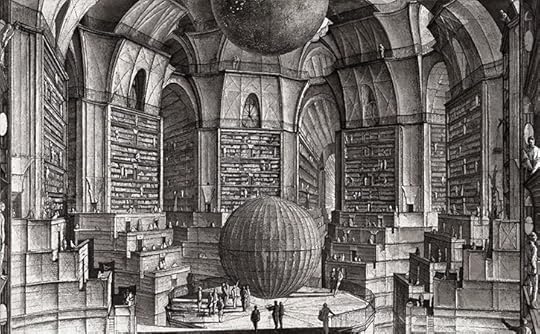
Okay, this is pretty awesome. Jonathan Basile has created Borges's Library of Babel online. You can choose books off the shelves and read them! In an interview at Flavorwire, Basile says: "When I started building the site, I actually had in the back of my mind the idea that a searchable, virtual Library of Babel might make it possible to find a few of those rational arrangements of letters. I very quickly realized how incorrect I was. And that I think is the most important part of the project — it gives that brief glimmer of hope, that reason might win out over unreason, then crushes it. In this way the site is true to Borges’ vision — I think he wants us to see that all the creations of reason, of human language and thought, are haunted and undermined by their irrational reproducibility."
Published on May 02, 2015 05:50
March 1, 2015
New Edition of The Illuminations
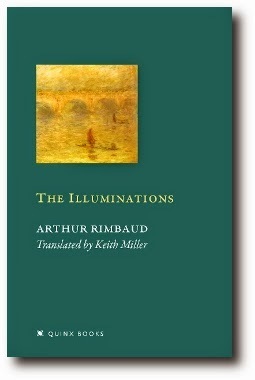
I have put out a new version of my translation of The Illuminations. It has a new cover and I've done a little bit of tidying up inside. It's available on Amazon.
Published on March 01, 2015 15:38



